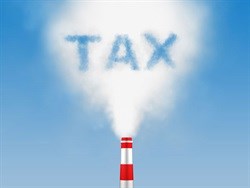
The premise of the carbon tax is to tax direct emissions associated with business activities. This will impact business in two areas, says Teresa Legg, director at carbon consultancy The Carbon Report.
"Firstly, an increase in taxation for large greenhouse gas emitters, the threshold for which has yet to be agreed. Secondly, an increase in electricity tariffs for all users (anywhere between 4 and 10c/kWh) as Eskom will be taxed on the emissions it produces which will in turn be passed on to customers through the tariff structure," Legg says.
Any increased cost to business is obviously detrimental but the problem with naysayer's views on carbon taxation is flawed. Many believe that energy use and particularly electricity is a fixed cost within a business and hence will be taxed. Any CEO who holds this view and hence does nothing around reducing electricity consumption has a flawed business strategy.
Electricity and energy in a business is not a fixed cost. It is a variable cost and can be effectively managed. Energy waste, particularly electricity waste is prevalent in every organisation. Any process, plant or technology deployed more than five years ago is inherently inefficient. In fact most infrastructure in South Africa is far older than this. In the past we did not design for efficiency and waste is everywhere. Furthermore, even efficient technologies become inefficient as technology advances.
The International Energy Agency estimates that as much as 65% of all energy consumed by business is waste. Even worse, the waste in your business which is impacting your bottom line has an associated value based on your price-earnings ratio. So R2m waste could in fact be worth R10m to the value of the business using a multiplier of five.
"The message is simple," says Legg. "To make money out of carbon tax, you need to reduce your energy consumption. This reduces costs, hence increases profits and shareholder value. Your strategy should be to calculate the exposure that your business will be faced with as a result of the current tax proposals and put a plan in place to reduce energy sufficiently to at least absorb this with zero impact on the bottom line. Every business should be able to achieve this. A second phase should be to continue this process in an iterative cycle to start making money out of efficiency, irrespective of the tax," she elaborates.
The smart CEO is the one that recognises that energy is a variable cost. Once you have made this connection you are half way there. The next step is to make somebody accountable for energy reduction in your business, set a target and then build a plan to meet that target. This should not be efficiency for the sake of efficiency or for espousing your 'green credentials'.
Every investment decision should be backed by sound returns on investment and anything that does not provide an acceptable payback should be discarded. In fact, before any capital investment is considered all process tweaks, social engineering and non-financial opportunities to reduce consumption should be exhausted.